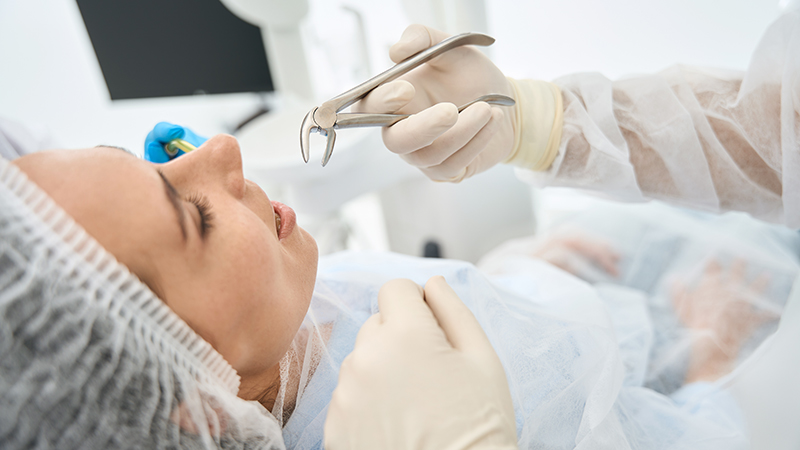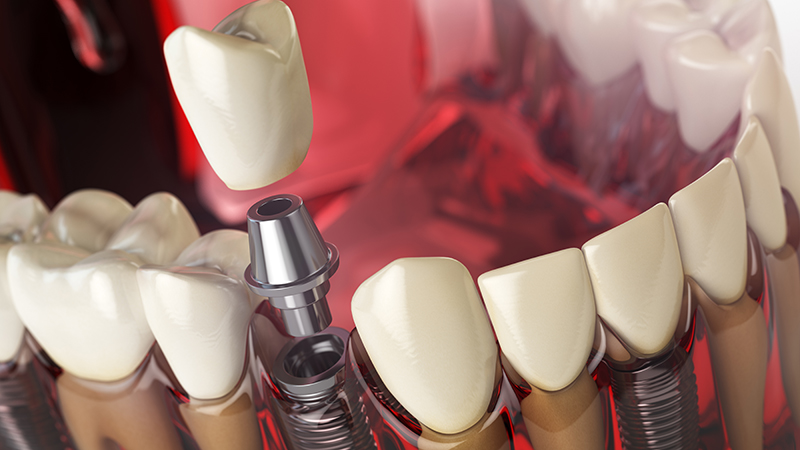
Tooth extraction is commonly performed to address a severely damaged tooth. Many dentists consider tooth extractions as a last resort. Our dental care team will do the best they can to preserve the natural teeth. Dr. Izvernari will perform an evaluation to determine if the tooth can be restored with root canal therapy first. If a tooth extraction is deemed necessary, she will work with you to create a treatment plan based on personal needs.
A tooth extraction is usually performed under local anesthesia. If necessary, our team can provide dental sedation to create a more comfortable experience. The tooth is gently removed from the socket by the root. The socket is carefully cleaned and sutured to prevent infection and irritation. To stop the bleeding and begin the healing process, it is important for a blood clot to form. A small amount of bleeding is considered normal. Our team will supply detailed aftercare instructions to promote a healthy, speedy recovery.
You should avoid smoking, rinsing, or drinking through a straw for at least 24 hours because it can dislodge the clot, delay healing, and lead to dry socket. Most patients recover fully within a day or two after the procedure. Tooth extractions may be necessary for:

One of the most common types of tooth extractions is wisdom teeth removal. Wisdom teeth removal usually occurs during the late teens and early twenties.
Our team will perform a full, comprehensive exam and X-rays to determine if wisdom teeth removal is necessary.
In some cases, the teeth are impacted or crowded, which will require the removal of the wisdom teeth. Impacted wisdom teeth can cause pain, infection, and swelling of the soft tissue and face.
Our team will discuss all aspects of the wisdom teeth procedure during your consultation.

After you have a tooth extracted, it is very important to replace it. We offer a full range of missing teeth replacement options in our dental office.
Even one missing tooth will have negative effects on your oral health. The surrounding teeth will begin to shift towards the void, and bone will begin to deteriorate.
The number of teeth you are having extracted will determine which type of restoration you will need. Your options include a dental bridge, a partial denture, or a denture.
You also have the option of replacing any number of extracted teeth with dental implant(s).
Our team will recommend dental implants to replace your extracted tooth or teeth. Dental implants are the number one recommended solution for patients with missing or damaged teeth. They are the most natural-looking and advanced solution when compared to other teeth restoration options. We perform all aspects of the dental implant procedure in dental office.
Like any other procedure, you’ll want to follow your doctor's recommendations, as they will be aware of any activities you may want to avoid within the first few hours of having a tooth removed. A typical recommendation is to eat only soft foods for the first 24 hours.
After you have a tooth extracted, it is very important to replace it. Even one missing tooth will have negative effects on your oral health. The surrounding teeth will begin to shift towards the void, and bone will begin to deteriorate. Your options include a dental bridge, a partial denture, or a denture. Our team will recommend dental implants to replace your extracted tooth or teeth, as they are the most natural-looking and advanced solution when compared to other teeth restoration options.
Patients undergo local anesthesia when they have a tooth extracted. This results in feeling movement and pressure as the dentist undertakes the procedure, but the benefit is feeling no pain throughout the process.
The process of removing a single tooth can take 20-40 minutes from start to finish. Obviously, the more teeth you have removed, the more time this can take. Consider adding an additional 5-10 minutes per extra tooth.
You should avoid smoking, rinsing, or drinking through a straw for at least 24 hours because it can dislodge the clot, delay healing, and lead to dry socket. A small amount of bleeding is considered normal. Our team will supply detailed aftercare instructions to promote a healthy, speedy recovery. Most patients recover fully within a day or two after the procedure.
The extraction of a tooth is usually performed under local anesthesia. To make your experience more comfortable, our team can provide dental sedation if necessary. An extraction is performed by gently removing the tooth from the socket, followed by careful cleaning and suturing. Blood clots help stop bleeding and start the healing process.
Tooth extraction is commonly performed to address a severely damaged tooth. Many dentists consider tooth extractions as a last resort. Dr. Izvernari will perform an evaluation to determine if the tooth can be restored with root canal therapy first. Tooth extractions may be necessary for overcrowded teeth, damaged teeth, diseased teeth, or impacted wisdom teeth.